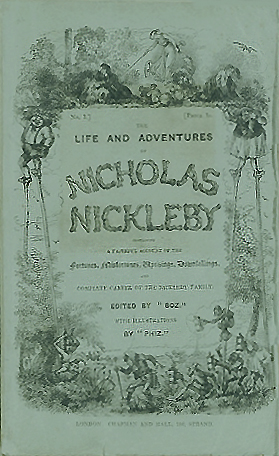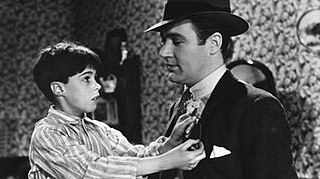Related Research Articles

Night Must Fall is a play, a psychological thriller, by Emlyn Williams, first performed in 1935. There have been three filmed adaptations: Night Must Fall (1937); a 1954 adaptation on the television anthology series Ponds Theater starring Terry Kilburn, Una O'Connor, and Evelyn Varden; and Night Must Fall (1964).

Middlemarch, A Study of Provincial Life is a novel by English author George Eliot, the pen name of Mary Ann Evans. It appeared in eight installments (volumes) in 1871 and 1872. Set in Middlemarch, a fictional English Midlands town, in 1829 to 1832, it follows distinct, intersecting stories with many characters. Issues include the status of women, the nature of marriage, idealism, self-interest, religion, hypocrisy, political reform, and education. Despite comic elements, Middlemarch uses realism to encompass historical events: the 1832 Reform Act, early railways, and the accession of King William IV. It looks at medicine of the time and reactionary views in a settled community facing unwelcome change. Eliot began writing the two pieces that formed the novel in 1869–1870 and completed it in 1871. Initial reviews were mixed, but it is now seen widely as her best work and one of the great English novels.

Kate O'Mara was an English film, stage and television actress, and writer. O'Mara made her stage debut in a 1963 production of The Merchant of Venice. Her other stage roles included Elvira in Blithe Spirit (1974), Lady Macbeth in Macbeth (1982), Cleopatra in Antony & Cleopatra (1982), Goneril in King Lear (1987), and Marlene Dietrich in Lunch with Marlene (2008).

Ring for Jeeves is a novel by P. G. Wodehouse, first published in the United Kingdom on 22 April 1953 by Herbert Jenkins, London and in the United States on 15 April 1954 by Simon & Schuster, New York, under the title The Return of Jeeves.

Nicholas Nickleby, or The Life and Adventures of Nicholas Nickleby, is the third novel by Charles Dickens, originally published as a serial from 1838 to 1839. The character of Nickleby is a young man who must support his mother and sister after his father dies.

Grace Dalrymple Elliott was a Scottish courtesan, writer and spy resident in Paris during the French Revolution. She was an eyewitness to events detailed in her memoirs, Journal of my life during the French Revolution published posthumously in 1859. She was mistress to the Duke of Orléans and to the future George IV, by whom she is said to have borne an illegitimate daughter. Elliott trafficked correspondence and hid French aristocrats escaping from the French Revolution. She was arrested several times but managed to avoid the guillotine, and was released after the death of Robespierre.

The Lost Language of Cranes is a novel by David Leavitt, first published in 1986. A British TV film of the novel was made in 1991. The film was released on DVD in 2009.

The Cocktail Party is a verse drama in three acts by T. S. Eliot written in 1948 and performed in 1949 at the Edinburgh Festival. It was published in 1950. The play was the most popular of Eliot's seven plays in his lifetime, although his 1935 play, Murder in the Cathedral, is better remembered today. It focuses on a troubled married couple who, through the intervention of a mysterious stranger, settle their problems and move on with their lives.

A.J. Quartermaine is a fictional character from General Hospital, an American soap opera on the ABC network. Born on-screen in 1979 as the only biological child of the iconic Drs. Alan and Monica Quartermaine, A.J. was "SORASed" in 1991, revising his birth year to 1973. The role has been most notably portrayed by the actors Sean Kanan from 1993 to 1997 and Billy Warlock from 1997 to 2003, with a brief return in 2005. Kanan made his on-screen return as A.J. on October 26, 2012, after a 15-year absence. Kanan announced in March 2014 that he would once again be leaving the series, voicing his disappointment over the writing for the character.

Lesley Webber is a fictional character from General Hospital, that is an American soap opera on the ABC network. Actress Denise Alexander portrayed the role from March 13, 1973, through February 28, 1984, as a series regular, and from 1996 to 2009 as a recurring character. Alexander briefly returned to the series in 2013 to commemorate its 50th anniversary and has since made subsequent appearances in 2017, 2019, and 2021.

Dominique Deveraux is a fictional character on the ABC prime time soap opera Dynasty and its spin-off, The Colbys. Portrayed by Diahann Carroll from 1984 to 1987, the character is the surprise half-sister of millionaire Blake Carrington. Dominique was written out of the series at the end of its seventh season, and did not return for the 1991 miniseries Dynasty: The Reunion.

Something Always Happens is a 1934 British romantic comedy film directed by Michael Powell and starring Ian Hunter and Nancy O'Neil. It was made as a Quota quickie.

The Life and Adventures of Nicholas Nickleby is a 1947 British drama film directed by Alberto Cavalcanti and starring Cedric Hardwicke, with Derek Bond in the title role. The screenplay by John Dighton is based on the Charles Dickens novel The Life and Adventures of Nicholas Nickleby (1839). This first sound screen adaptation of the book followed silent films released in 1903 and 1912.

Monica Scott Colby is a fictional character from the ABC television series Dynasty and its spin-off The Colbys, both created by Richard and Esther Shapiro. Portrayed by Tracy Scoggins, the character was introduced on Dynasty in the November 1985 two-part episode "The Titans" as the lawyer daughter of wealthy California CEO Jason Colby and his socialite wife, Sable. Scoggins was subsequently a series regular on The Colbys for two seasons from 1985 to 1987. She reappeared as Monica on Dynasty for its final eight episodes in 1989.

Passion Flower is a 1930 American pre-Code drama film directed and produced by William C. deMille and starring Kay Francis, Kay Johnson and Charles Bickford in a romantic triangle. This production includes actor Ray Milland's American screen debut, although his appearance as a party guest is uncredited.

Finding Neverland is a musical with music and lyrics by Gary Barlow and Eliot Kennedy and a book by James Graham adapted from the 1998 play The Man Who Was Peter Pan by Allan Knee and its 2004 film version Finding Neverland. An early version of the musical made its world premiere at the Curve Theatre in Leicester in 2012 with a book by Allan Knee, music by Scott Frankel and lyrics by Michael Korie. A reworked version with the current writing team made its world premiere in 2014 at the American Repertory Theater in Cambridge, Massachusetts. Following completion of its Cambridge run, the production transferred to Broadway in March 2015.

Jules Henry Sherek (1900–1967) was a British theatrical manager, known for producing the plays of T. S. Eliot.
Come On, Jeeves is a comedic play co-written by Guy Bolton and P. G. Wodehouse. The play was written in the summer of 1952, and toured the English provinces in the summer of 1954. Wodehouse adapted the play into the novel Ring for Jeeves, which was first published in April 1953, a year before the play reached production. Come On, Jeeves is still occasionally produced and was presented as recently as December 2017.
References
- ↑ "The Elder Statesman" City Paper. Retrieved 2014-5-5.
- ↑ Darlington, W. A. (2004). "Henry Sherek". Oxford Dictionary of National Biography . Oxford University Press . Retrieved 27 July 2014.
